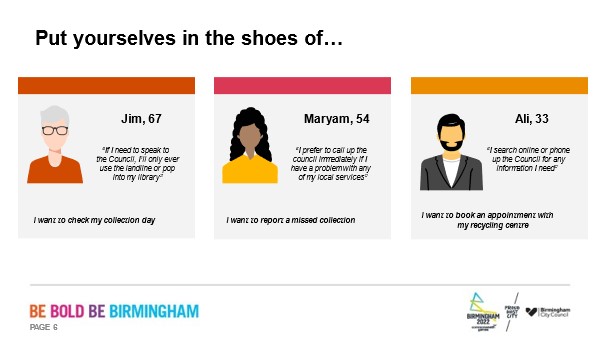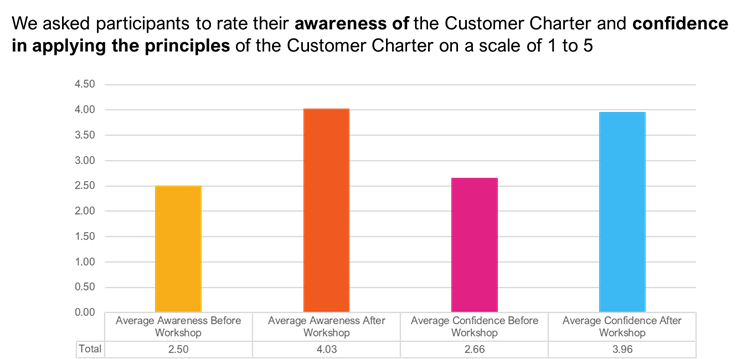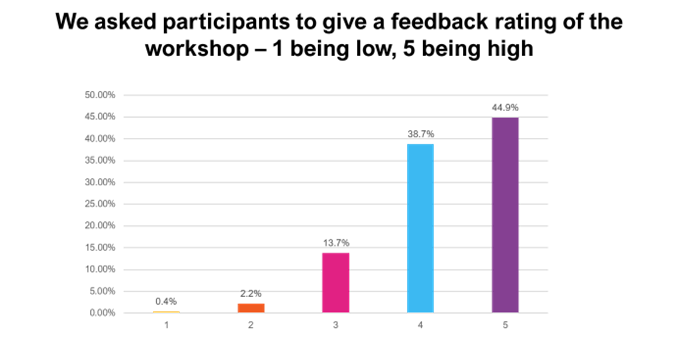A lot has happened since our last end of year update, so this week our update provides highlights of a few of our workstreams. This is just a snapshot as there’s a lot going on and many crossovers with other programmes. We hope by working in the open we can keep you updated on our work.
Please reach out to us if you wish to speak with us about the work we are doing. We would be very happy to bring this work to service areas across the council through a lunch and learn.
Contact: [email protected]
Customer Panel
The customer panel have continued to meet regularly and to date have conducted user testing on:
- the new Clean Air Zone FAQs
- the redesigned web content for waste management
They will convene again on 7 June 2023 for their 8th meeting since the start of the programme.
In support of the delivery of the Customer Service Strategy vision to adopt customer-centred service design principles, the customer panel also held a specially convened session on 3 May 2023 to help inform the design and potential deployment of a voice automation solution for the corporate contact centre.
The panel walked through the functionality and features of a voice automation solution and participated in an interactive demonstration of the technology, adopting personas and testing scenarios in real time.

The technology was well received by the panel, who could see the potential value and benefits and also provided challenges from their lived experience, which will be incorporated as part of the voice automation discovery recommendations for next steps.
Voice Automation
We are nearing the completion of a 6-week discovery to test the viability of deploying voice automation technology in the corporate contact centre. This is software that will improve the experience of customers contacting the council.
Working in collaboration with delivery partner, Price Waterhouse Coopers, we are fact-finding across a range of service areas to gather data about the business systems supporting the services that could potentially be in scope. This is to understand integration capabilities, API availability and constraints.
Discovery outputs and recommendations will be presented to the Financial Sustainability Board on 18 May to inform next steps and a potential proof-of-concept phase to demonstrate that the technology meets the needs of both customers and services.
Culture Change
A key deliverable of the customer service strategy and the ambition to be a customer-focused council was to raise awareness and embed the principles of our Customer Charter among our 9,747 staff. The aim of this is to shift our organisational culture and put our customers at the heart of everything we do.
All staff were invited to attend a customer standards workshop during Phase 1 to hear what our customers are saying about us. This applied the principles of our customer charter, ensuring all our decisions focus on delivering the best services for our customers and identifying barriers preventing us from providing excellent customer service.
4,863 staff members attended a workshop from September 2022 to March 2023 (50% of all staff). It gave directorate-level insight into the top 3 barriers to delivering good customer service. High workload was the most common theme. Following the workshops:
- there was a 61% increase in charter awareness
- there was a 49% increase in confidence in applying the charter principles
- 84% of staff rated the workshops good or excellent



The phase 2 culture change workstream has a clear action plan that includes targeted engagement for staff who did not attend a workshop in phase 1, as well as:
- ensuring policy, systems and practice have a customer focus
- ensuring directorate packs include an accessible offline workers’ tool
Child Employment
The Child Employment workstream is focusing on testing the riskiest assumptions that were identified and prioritised in the previous phases of work.
We kicked off this phase by agreeing on the right approach and plan for the next 6 months. In order to do that, the team developed a high-level project roadmap along with a delivery plan. These artefacts will be used in our planning sessions and will help us with future decision-making processes.
During sprint planning we all committed to the following goals:
- building a shared understanding of the work ahead for the next 6 months.
- planning to launch the recruitment of user research participants, including developing the research plan, communication plan and consent form.
- We initiated desk research, focusing on research into chaperone applicant training to explore platforms currently used to deliver the training, understand the current offer based on previous research and get familiar with legislative requirements, among other activities.
- Work towards developing the first low-fidelity prototypes and estimating the effort required. The low-fidelity prototypes in this phase of work will be focused on testing the content, therefore we will be co-designing them with content experts.
We have also had some great engagement from the service area, with this culminating in a playback with Tracey Linton, Interim Head, Child Employment Team, to ensure alignment on the approach moving forwards, and agree the essential ‘must-have’s and what might be considered desirable (nice-to have’s’) for our future work.
Content Team
The content workstream continues to focus on the redesign of the content on the Birmingham.gov website to GDS standards. The team has been focusing on the delivery of a content roadmap, based on our Top 50 analysis of customer interaction, and understanding the as-is process in the Web Content team. We have prioritised these activities as they will set the foundation for the future content design decisions.
To help define the roadmap, the team has undertaken several research activities, such as:
- rapid audits of 4 service areas
- mapping out the content and information architecture of the content
- roadmapping the findings onto a standard “now, near future, next future” template.
Bereavement
In addition to the new content created for the service, all existing Bereavement Services pages and sections have now been reviewed, improved and went live in November.
We are now working on the content design for memorials, implementing 20 digital forms with advanced payment functionality to give customers the option to select a motif for a memorial, upload their own designs and to pay online.
The next priorities for the service are the coroners’ content, and the redesign of “cemetery friends”.
Housing
The housing home page has been improved, with links cleaned up; and improved and more logical user journeys. Services and content for the homeless, council tenants and leaseholders have been made more prominent and structured under “tiles” instead of buried links.
More recently, housing applications and needs assessment content has been reworked; the apply for social housing content and housing options and advice simplified and now sits under 3 tiles instead of 10; the content and journeys having now been improved to reflect user needs.
The team also worked on the new selective licensing pages as part of the new legislation and soft-launched ahead of schedule on 02 May.
The scheme is designed to improve standards for tenants as the landlord license fee will support inspection and enforcement action. The pages include a postcode checker, for the potential 60,000 landlords affected, to confirm where their property is and an online form to apply for a license.
We are now currently working on 10 areas of council tenancy content and have identified the service owners and are in the process of arranging the collaboration sessions.
Early Intervention and Prevention
We have also been engaging with the Early Intervention and Prevention programme to support their content needs around local welfare provision and debt advice, including housing evictions, rent arrears and energy bills. Our work has included:
- identifying and liaising with subject matter experts (SMEs)
- working with SMEs to establish factual content
- working to transfer out-of-date pdf content into up-to-date html content, written and designed according to GDS standards, on relevant web pages
We also provided content expertise to work together to refine ways of working, roadmaps and priorities – and will meet next sprint to agree an aligned approach.
Show and Tell
Programme show and tells for phase 2 are due to recommence on 7th June 2023, 13:00 – 14:00.
